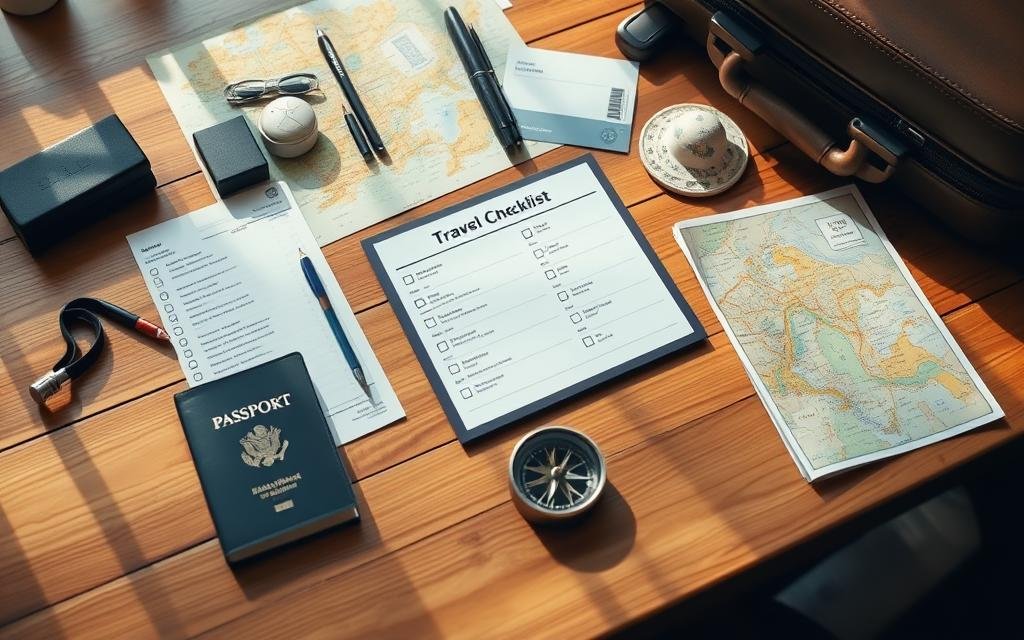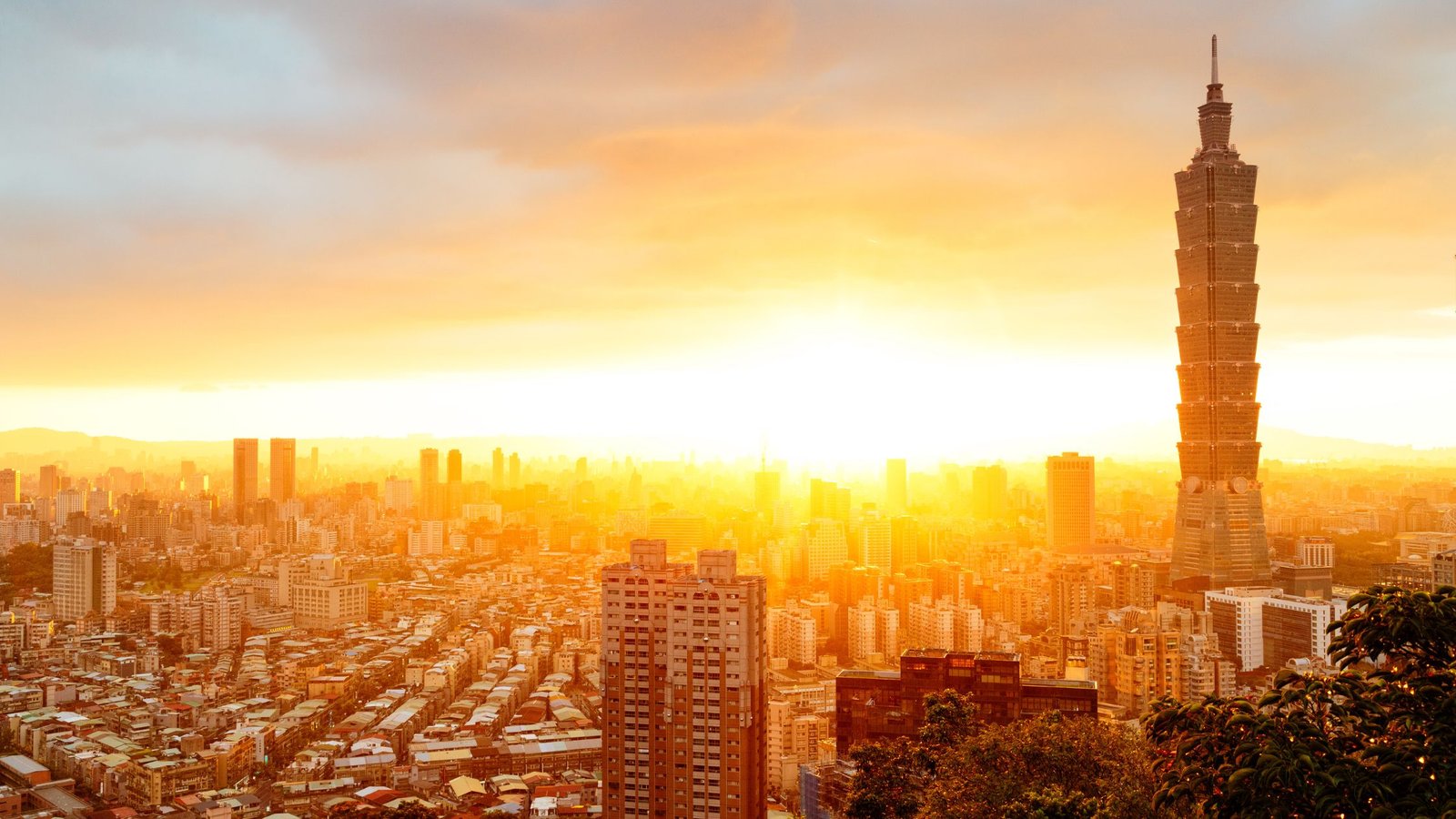Ever stood at the airport, wondering if you packed everything? I’ve traveled a lot and found that a good checklist makes all the difference. It makes packing easier and reduces travel stress. My checklist covers everything from important documents to must-have items, helping both new and experienced travelers.
Key Takeaways
- An international travel checklist is vital for organized travel preparation.
- Utilizing travel preparation tips enhances confidence and reduces stress.
- A complete checklist includes more than just packing—it covers essential documents and safety.
- Being well-prepared lets travelers enjoy their trip without worrying about last-minute things.
- Using a systematic planning approach can make your trip smoother.
Understanding the Importance of an International Travel Checklist
When getting ready for a trip abroad, a good checklist is key. It makes sure you have everything you need before you leave. This way, your trip can go smoothly without any hiccups.
Why I Need a Checklist
Planning my trip needs a clear plan. A checklist helps me see all the steps to take before I go. It breaks down tasks into smaller parts, from money matters to packing.
This makes organizing my time easier. It makes the pre-trip work less stressful.
Benefits of Being Organized
Being organized has many perks. It reduces stress because I know I’ve got everything covered. It also makes my trip more fun.
Forgetting something important can ruin the excitement. But with a checklist, I’m ready for anything. I can start my journey with confidence.
Essential Travel Documents
Before I travel internationally, I make sure I have all the necessary documents. I start by checking passport and visa needs. It’s important to follow the rules of each country to avoid trouble at immigration.
Passport and Visa Requirements
My passport must be valid for at least six months after I return. Some places need a visa, which I must apply for early. I use official sites or trusted travel websites to find out what I need.
Travel Insurance Information
Travel insurance is a must for me. It covers unexpected health issues and trip cancellations. I check my policy to know what’s covered and how to make a claim while traveling.
Copies of Important Documents
To protect my documents, I make copies. I store digital copies online and keep physical ones in a safe place. This way, I can quickly replace them if they get lost or stolen.
| Document Type | Check Requirement | Notes |
|---|---|---|
| Passport | Valid for 6 months post-return | Check expiration date |
| Visa | Research required | Apply in advance if needed |
| Travel Insurance | Purchase before departure | Read policy details |
| Document Copies | Make copies | Store securely |
Packing Essentials for International Travel
Packing for a trip abroad can be overwhelming. I make a detailed packing list to make it easier. I group items by type to ensure I have what I need without overpacking.
Categorizing My Packing List
I sort my list by activities, climate, and tech needs. This makes packing faster and more organized. I choose clothes that can be worn in different situations to save space.
Weather Considerations
Weather varies by destination. I check the forecast before packing. This helps me pack right for sunny or rainy days. I also bring layers for any weather changes.
Must-Have Gadgets
Today, some items are essential for travel. A portable charger keeps my devices charged. I also bring international power adapters for my electronics. Plus, I pack travel-sized toiletries to follow airline rules and keep my bag light.
Health and Safety Precautions
Keeping myself safe while traveling abroad is very important. I use a traveler’s health checklist to know about vaccinations and other safety steps. This helps lower the risks of getting sick while traveling.
Vaccination and Medication Needs
Every country has its own health rules for travelers. I must check which shots I need for my destination. Keeping a record of my vaccinations helps me follow these rules. I also pack my medicines, like prescriptions and over-the-counter drugs, for common sicknesses.
First Aid Kit Essentials
A good first aid kit is key for any trip. I pack band-aids, antiseptic wipes, tape, pain relievers, and antihistamines. These items help me deal with small injuries or health problems that might happen while I’m away.
Safety Tips for Travelers
Being safe while traveling is more than just health care. I use my common sense in new places. I research local health services so I know where to go if I need help. Staying up-to-date with health alerts helps me avoid risks during my trip.
Financial Preparations Before Traveling
Getting ready financially for international travel is key for a smooth trip. Knowing how to exchange currency is the first step. It’s smart to look up current exchange rates and find reliable places to exchange money in your destination.
Knowing where to exchange money can save you money on fees.
Currency Exchange Tips
Here are some tips for currency exchange:
- Check the latest exchange rates online.
- Opt for local currency over USD when possible.
- Use currency exchange apps for real-time rates.
- Consider withdrawing cash from ATMs abroad for better rates.
Informing My Bank
Before I leave, I tell my bank about my travel plans. This stops them from freezing my cards because of unusual activity. I tell them where I’m going, when, and what I’ll be doing.
Budgeting for My Trip
Creating a budget is essential for a worry-free vacation. I make a detailed budget for things like where I’ll stay, eat, and what I’ll do. This way, I can plan my spending better.
Here’s a simple budgeting table I use:
| Expense Type | Estimated Cost |
|---|---|
| Accommodation | $200 per night |
| Food | $50 per day |
| Transportation | $30 per day |
| Activities | $100 total |
| Miscellaneous | $50 total |
Communication Needs While Abroad
Effective communication is key when traveling internationally. I need to pick a mobile plan that suits my travels. Knowing the benefits of different mobile plans, like international packages or local SIM cards, can make my trip better.
Choosing My Mobile Plan
I look at mobile plans based on coverage, data limits, and cost. Many big carriers have international packages that work well in many countries. Local SIM cards might be cheaper for longer trips. Travel tips say to think about each option’s good and bad points to stay connected.
Language Translation Apps
Communicating can be tough, mainly in places where English isn’t common. Using reliable language apps on my phone is super helpful. Apps like Google Translate or Duolingo help me talk to locals and understand text. These tools make my trip better by helping me get around and connect with people.
Emergency Contacts
Having a list of emergency contacts is important for feeling safe. I include numbers like the local embassy, my travel insurance, and family. Having this info ready helps me handle emergencies fast, showing how vital communication is while traveling.
Transportation Arrangements
Getting around is key to a great trip abroad. Planning your travel transport is important for a smooth journey. This includes booking flights, checking out local transport, and renting cars.
Flights and Reservations
Booking flights early is a must. It helps avoid price hikes and ensures you get the dates you want. Always check your flight times to avoid surprises. Keeping your flight details handy makes traveling easier.
Ground Transportation Options
Knowing your transport options at your destination is vital. Look into public transport, taxis, and private transfers. Public transport is cheap, while taxis are handy for quick trips. Researching your destination saves time and money, making your trip better.
Rental Car Considerations
If you plan to see more than the city, renting a car is a good idea. Check if you need an international driving permit. Also, make sure you have the right insurance. Knowing the local driving laws helps in choosing the right car rental.
Accommodation Checklist
When planning my international trip, making an accommodation checklist is key. I look into different places to stay like hotels, hostels, or vacation rentals. This helps me find the perfect spot.
Doing my homework lets me compare prices, amenities, and locations. It’s all about making smart choices.
Finding the Right Place to Stay
Looking into various places to stay changes how I see my trip. I use travel tips to find places close to attractions and easy to get to. I also check if they have what I need nearby.
I like places that fit my style, whether it’s a cozy bed-and-breakfast or a modern hotel.
Reservations and Confirmation
After picking my spot, booking it is next. I book through trusted sites to feel secure. I make sure I get a confirmation email or app notice.
Keeping these confirmations helps me stay on track. It’s a big part of my checklist.
Local Etiquette
Knowing local customs is important for a better stay. Different places have their own ways of doing things. Learning a bit of the local language or customs makes my trip richer.
Being polite to the staff and hosts makes my stay better. It helps me make good memories.
Cultural Research Before I Go
Before I travel, I find cultural research makes my trip better. Knowing local customs helps me connect with locals. It also keeps me from making cultural mistakes.
Understanding Local Customs
Learning about local customs is key. Each culture has its own way of doing things. For example, knowing how to greet people shows respect.
Important Phrases in the Local Language
Learning a few local phrases changes my travel. Saying hello or thank you can make a big difference. It shows I’m interested in the culture.
Cultural Sensitivity Tips
Being culturally sensitive is important. I learn about things to avoid and how to behave. This way, I can enjoy my trip without causing offense.
| Cultural Aspect | Tips for Travelers |
|---|---|
| Greeting Customs | Learn common greetings; adapt to the local style. |
| Dining Etiquette | Research table manners and local dining practices. |
| Dress Codes | Understand appropriate attire for specific locations. |
| Social Norms | Be aware of personal space and conversation boundaries. |
Preparing for Arrival
Getting ready for my arrival is key to a smooth start. Planning well can reduce stress, like figuring out how to get from the airport. Knowing the local customs and laws is also vital. It helps me fit in and follow local laws for travelers.
Transportation from the Airport
There are many ways to get from the airport to my place. I can pick from:
- Public transport like buses and trains
- Airport shuttles for a cheaper ride
- Ride-sharing services like Uber or Lyft
- Rental cars for more freedom
Each option has its own benefits, depending on what I prefer and can afford.
Understanding My Destination
Then, I dive into learning about my destination. Knowing the local culture makes my trip better. I’ll look into the culture, top sights, and where to eat. This way, I can really get into the local vibe.
Local Laws and Regulations
Before I go, I’ll learn about the local laws for travelers. It’s important to know about:
- How to handle money and exchange rates
- What’s legal and what’s not
- What’s expected of me in public
Knowing these rules helps me stay out of trouble and respect the place I’m visiting.
Packing for International Customs
When I travel internationally, I must know about customs rules. Each country has its own rules for packing. It’s important to know what items are banned to avoid fines and make entry easier.
List of Prohibited Items
Before packing, I check the list of banned items for my destination. Commonly, items like:
- Weapons, including firearms and knives
- Explosives and flammable materials
- Endangered species products, such as certain furs or ivory
- Narcotics and illicit drugs
- Counterfeit goods, such as fake designer items
Declaring Goods Upon Arrival
When I arrive, I must declare my goods. This includes gifts, electronics, and cash. Not declaring can result in penalties. I need to know what to declare and have my documents ready.
What to Expect at Immigration
At immigration, my documents will be checked. I’ll be asked about my trip, why I’m there, and how long I’ll stay. Being calm and prepared helps a lot.
Final Checks Before Departure
As I get ready for my international trip, making sure everything is in order is key. I focus on last-minute tips to enhance my journey. I check all my bookings and have my checklist ready to avoid missing anything.
Last-Minute Arrangements
It’s important to tie up any loose ends before I leave. I review my itinerary and confirm all payments. I also check for any special requests, like food preferences at hotels or airlines.
Contacting Friends or Family
Telling friends or family about my travel plans is a must. I share my itinerary and contact info with them. This way, they know how to reach me if needed, giving me peace of mind.
Setting Up Automatic Payments
Setting up automatic payments for bills is a smart move. It ensures my finances are taken care of while I’m away. This lets me enjoy my trip without worrying about money.


